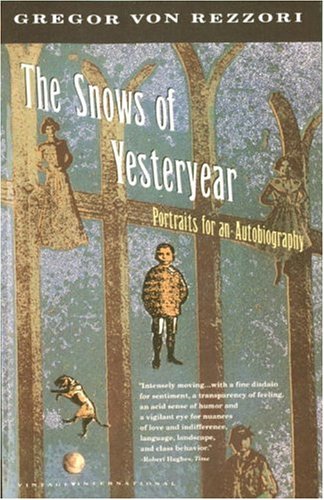Austro-Hungarian Fiction and Belles-Lettres
Explore a curated list of Austro-Hungarian fiction and belles-lettres, featuring classic and lesser-known works from the region's rich literary heritage. Discover timeless novels, essays, and stories that defined an era.

Book
The Radetzky March
by Joseph Roth
The Radetzky March, Joseph Roth's classic saga of the privileged von Trotta family, encompasses the entire social fabric of the Austro-Hungarian Empire just before World War I. The author's greatest achievement, The Radetzky March is an unparalleled portrait of a civilization in decline, and as such a universal story for our times.

Book
The Man Without Qualities, Vol. 1
by Robert Musil
Set in Vienna on the eve of World War I, this great novel of ideas tells the story of Ulrich, ex-soldier and scientist, seducer and skeptic, who finds himself drafted into the grandiose plans for the 70th jubilee of the Emperor Franz Josef. This new translation--published in two elegant volumes--is the first to present Musil's complete text, including material that remained unpublished during his lifetime.

Book
The Man Without Qualities, Vol. 2
by Robert Musil
"Musil belongs in the company of Joyce, Proust, Kafka, and Svevo. . . . (This translation) is a literay and intellectual event of singular importance."--New Republic.

Book
Night Games
by Arthur Schnitzler
Reinforces the Viennese author's remarkable achievement as literary modernist, depth psychologist, and prose stylist.

Book
Beware of Pity
by Stefan Zweig
Wes Anderson on Stefan Zweig: "I had never heard of Zweig...when I just more or less by chance bought a copy of Beware of Pity. I loved this first book. I also read the The Post-Office Girl. The Grand Budapest Hotel has elements that were sort of stolen from both these books. Two characters in our story are vaguely meant to represent Zweig himself — our “Author” character, played by Tom Wilkinson, and the theoretically fictionalised version of himself, played by Jude Law. But, in fact, M. Gustave, the main character who is played by Ralph Fiennes, is modelled significantly on Zweig as well." "Stefan Zweig was a dark and unorthodox artist; it's good to have him back."--Salman Rushdie The great Austrian writer Stefan Zweig was a master anatomist of the deceitful heart, and Beware of Pity, the only novel he published during his lifetime, uncovers the seed of selfishness within even the finest of feelings. Hofmiller, an Austro-Hungarian cavalry officer stationed at the edge of the empire, is invited to a party at the home of a rich local landowner, a world away from the dreary routine of the barracks. The surroundings are glamorous, wine flows freely, and the exhilarated young Hofmiller asks his host's lovely daughter for a dance, only to discover that sickness has left her painfully crippled. It is a minor blunder that will destroy his life, as pity and guilt gradually implicate him in a well-meaning but tragically wrongheaded plot to restore the unhappy invalid to health.

Book
The Good Soldier Svejk
Translates the iconoclastic Czech's classic satire depicting the adventures of a soldier during the First World War

Book
The Good Soldier Švejk and His Fortunes in the World War
by Jaroslav Hašek
"Good-natured and garrulous, Švejk becomes the Austrian army's most loyal Czech soldier when he is called up on the outbreak of the First World War - although his bumbling attempts to get to the front serve only to prevent him from reaching it. Playing cards, getting drunk and becoming a general nuisance, the resourceful Švejk uses all his natural cunning and genial subterfuge to deal with the doctors, police, clergy and officers who chivvy him towards battle. The story of a 'little man' caught in a vast bureaucratic machine, The Good Soldier Švejk combines dazzling wordplay and piercing satire to create a hilariously subversive depiction of the futility of war"--P. [4] of cover.

Book
The Confusions of Young Torless
by Robert Musil
At a bleak, isolated military school on the fringes of the Austro-Hungarian Empire, four young cadets —Torless, Beineberg, Reiting and their victim Basini—rift even further away from their school- fellows into a private world of ritual, secrecy and torture. For more than seventy years, Penguin has been the leading publisher of classic literature in the English-speaking world. With more than 1,700 titles, Penguin Classics represents a global bookshelf of the best works throughout history and across genres and disciplines. Readers trust the series to provide authoritative texts enhanced by introductions and notes by distinguished scholars and contemporary authors, as well as up-to-date translations by award-winning translators.

Book
Salt of the Earth
by Józef Wittlin
At the beginning of the twentieth century, the villagers of the Carpathian mountains lead a simple life, much as they have always done. The modern world has yet to reach the inhabitants of this remote region of the Habsburg Empire. Among them is Piotr, a bandy-legged peasant, who wants nothing more from life than an official railway cap, a cottage, and a bride with a dowry. But then the war reaches the mountains and Piotr is drafted into the army. All the weight of imperial authority is used to mould him into an unthinking fighting machine, forced to fight a war he does not understand, for interests other than his own. The Salt of the Earth is a classic war novel and a powerfully pacifist tale about the consequences of war for ordinary men.--

Book
The Snows of Yesteryear
by Gregor von Rezzori
The Snows Of Yesteryear is an uncompromising account of Gregor von Rezzori's aristocratic childhood in Romania in the days before World War II.

Book
Memoirs of an Anti-Semite
by Gregor von Rezzori
Set in Central Europe between World Wars I and II, this work comprises five interrelated stories that depict one man's ambivalent, at times obsessive, relations with Jewish friends and lovers--including his Jewish wife.


Book
The Road Into the Open
by Arthur Schnitzler
"One of the most important, representative, revelatory works of Austria at the turn of the century. . . . The best English version of the novel."—Marc A. Weiner, Indiana University "In Arthur Schnitzler the two strands of Austrian fin-de-siècle culture, the moralistic and the aesthetic, were present in almost equal proportions. Small wonder that Freud hailed Schnitzler as a 'colleague' in the investigation of the 'underestimated and much-maligned erotic.'"—Carl Schorske, author of Fin-de-Siècle Vienna

Book
Embers
by Sandor Marai
Originally published in 1942 and now rediscovered to international acclaim, this taut and exquisitely structured novel by the Hungarian master Sandor Marai conjures the melancholy glamour of a decaying empire and the disillusioned wisdom of its last heirs. In a secluded woodland castle an old General prepares to receive a rare visitor, a man who was once his closest friend but who he has not seen in forty-one years. Over the ensuing hours host and guest will fight a duel of words and silences, accusations and evasions. They will exhume the memory of their friendship and that of the General’s beautiful, long-dead wife. And they will return to the time the three of them last sat together following a hunt in the nearby forest--a hunt in which no game was taken but during which something was lost forever. Embers is a classic of modern European literature, a work whose poignant evocation of the past also seems like a prophetic glimpse into the moral abyss of the present

Book
The Rebels
by Sándor Márai
The third of the rediscovered novels of the great Hungarian writer is the jolting story of a troubled group of young men on the cusp of life, and death, in World War I.

Book
The World of Yesterday
by Stefan Zweig
Stefan Zweig (1881–1942) was a poet, novelist, and dramatist, but it was his biographies that expressed his full genius, recreating for his international audience the Elizabethan age, the French Revolution, the great days of voyages and discoveries. In this autobiography he holds the mirror up to his own age, telling the story of a generation that "was loaded down with a burden of fate as was hardly any other in the course of history." Zweig attracted to himself the best minds and loftiest souls of his era: Freud, Yeats, Borgese, Pirandello, Gorky, Ravel, Joyce, Toscanini, Jane Addams, Anatole France, and Romain Rolland are but a few of the friends he writes about.